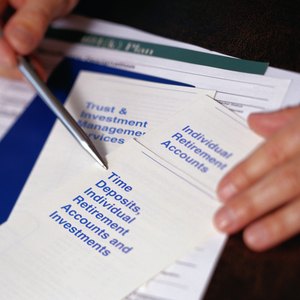
The government places few restrictions on the type of investments you can put in your individual retirement account. Your IRA can range from high-risk securities such as junk bonds to ultra-conservative Treasury bonds. If you are considering parking some of your IRA funds in a money market account, safety is a factor you should consider. When it comes to the security of your investments, money market accounts are not all created equal.
Definition
The "money market" typically refers to short-term, high-quality debt instruments, including bank certificates of deposit, U.S. government securities and high-grade commercial paper from stable U.S. corporations. Mutual funds that invest in money market securities are referred to as money market funds. A number of banks offer money market deposit accounts, which provide higher interest rates than traditional savings accounts but also have the convenience of check writing and account access through branded bank cards.
Deposit Account
A money market deposit account at an FDIC-member bank is one of the safest investments you can put in your IRA. The money in this account is insured by the Federal Deposit Insurance Corporation, up to $250,000, as of 2012. This amount is in addition to the $250,000 worth of deposit insurance you have on deposits in non-retirement accounts at the same bank. Similar insurance is available to credit union members through the National Credit Union Administration.
Mutual Fund
Money market mutual funds are only allowed by law to invest in low-risk securities. Even if the investments in the fund are insured by the FDIC, no money market mutual fund is insured by any federal agency. While money market funds are low-risk investments for your IRA, they are not 100 percent safe. Fund managers try to maintain a stable net asset value of $1 per share, with any investment gains coming from interest. However, in rare cases, a fund's NAV might dip below $1. This event, called "breaking the buck" can occur during a major financial downturn, when investors dump a company's commercial paper.
Considerations
Lower-risk investments generally offer a lower rate of return. Federally insured money market deposit accounts typically provide a lower return than money market mutual fund accounts that invest in high-quality, short-term securities. However, investment in a money market mutual fund involves more risk. You should consider your risk tolerance and investment goals when deciding which type of money market account is best for you.
References
- Federal Deposit Insurance Corporation: Ownership Categories Certain Retirement Accounts
- Forbes: Bernanke Warns That Money Market Mutual Funds Not 100 Percent Safe
- Nolo: Money Market Deposit Accounts and Mutual Funds
- CNNMoney: Are Money Market Accounts and Funds the Same?
- SEC: Different Types of Funds
- SEC. "Supplement to the Fidelity Government Money Market Fund, Fidelity Money Market Fund, Fidelity Treasury Money Market Fund, and Fidelity Treasury Only Money Market Fund." Accessed Oct. 10, 2020.
- ICI. "Re: IOSeO Money Market Fund Systemic Risk Analysis and Reform Options," Page 5. Accessed Oct. 10, 2020.
- U.S. Dept. of Treasury. "Report of the President’s Working Group on Financial Markets," Page 12. Accessed Oct. 10, 2020.
- SEC. "Disclosure of Mutual Fund Performance and Portfolio Managers," Page 5. Accessed Oct. 10, 2020.
- U.S. Dept. of Treasury. "Report of the President’s Working Group on Financial Markets," Page 15. Accessed Oct. 10, 2020.
- SEC. "Removal of Certain References to Credit Ratings and Amendment to the Issuer Diversification Requirement in the Money Market Fund Rule," Page 7. Accessed Oct. 10, 2020.
Resources
Writer Bio
Mike Parker is a full-time writer, publisher and independent businessman. His background includes a career as an investments broker with such NYSE member firms as Edward Jones & Company, AG Edwards & Sons and Dean Witter. He helped launch DiscoverCard as one of the company's first merchant sales reps.

